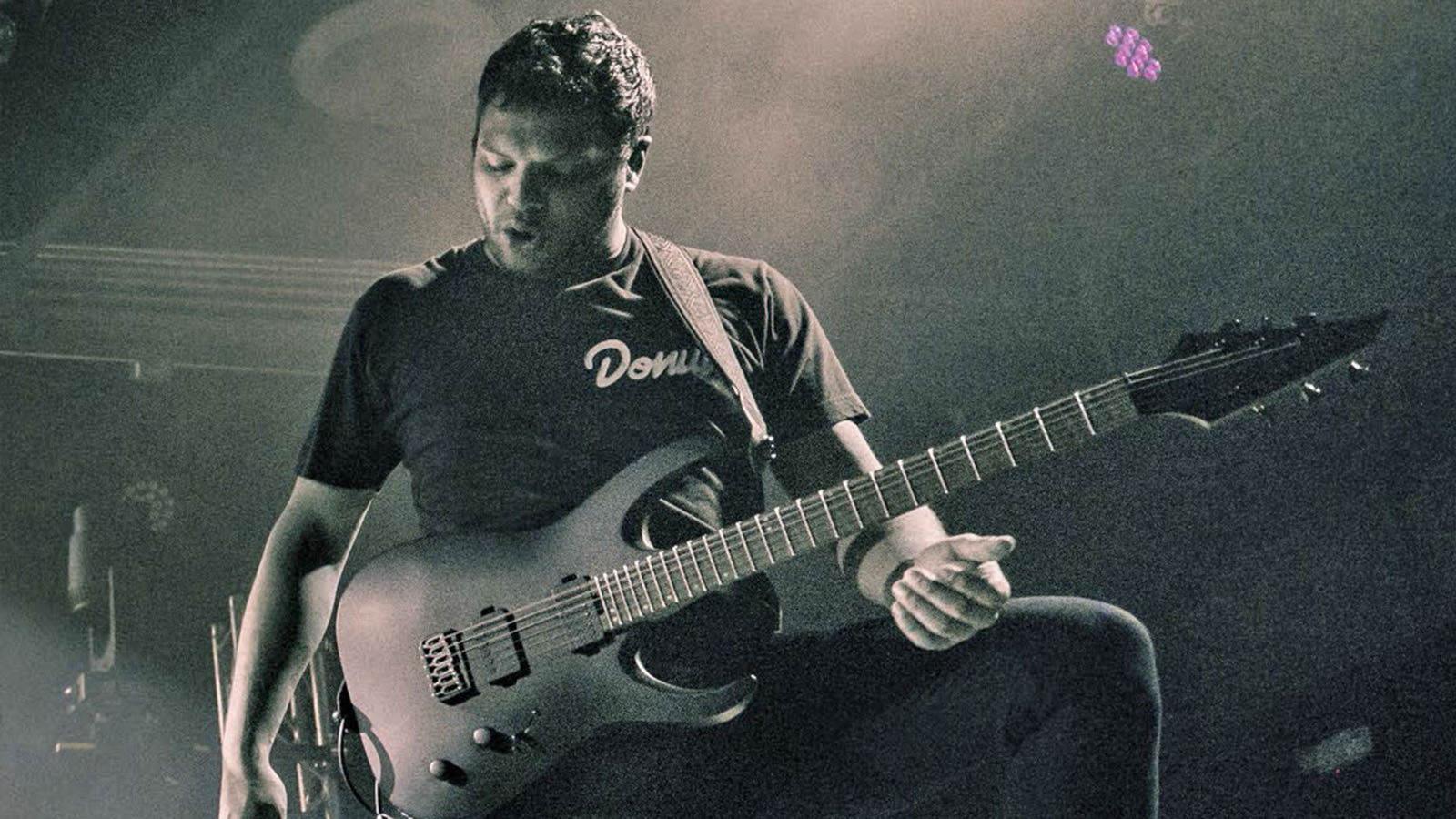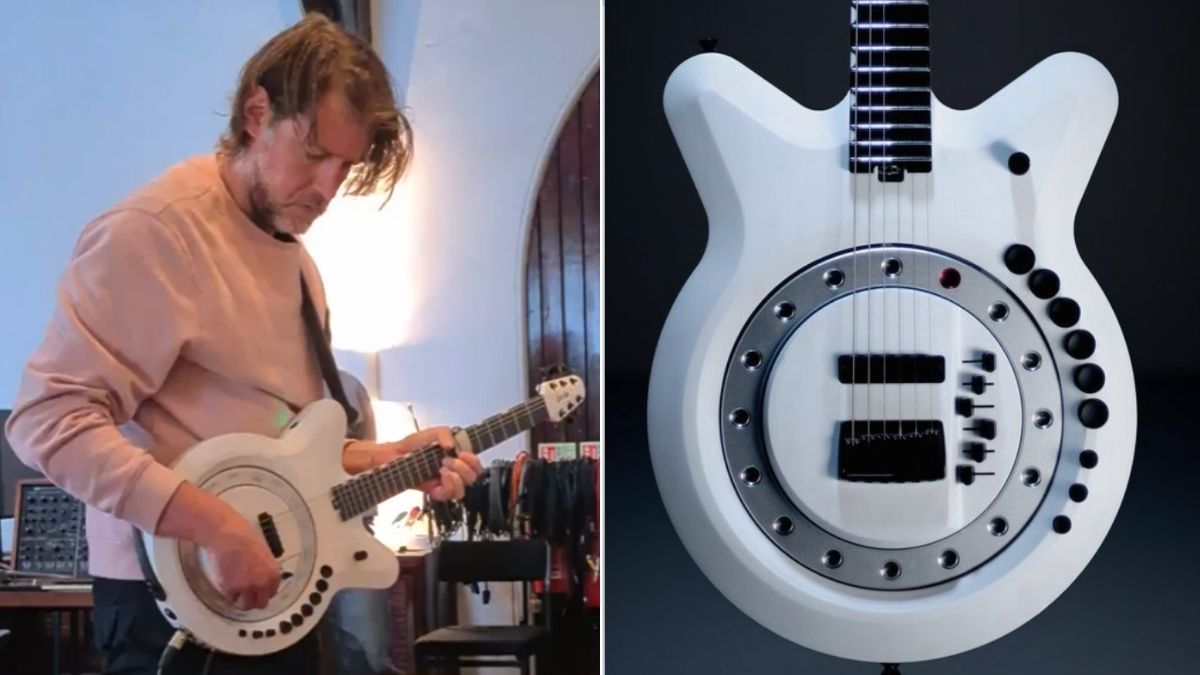Periphery: "Even though we all have our own signature guitars, when we record we like to pass them around quite a bit"
Misha Mansoor, Mark Holcomb and Jake Bowen go deep on the making of the heavy and experimental Periphery IV: Hail Stan

"You know, if you’d asked me early on in the process what I thought our new album was going to sound like, I would’ve told you 'artsy and experimental,'" says Periphery guitarist Misha Mansoor about the recently released Periphery IV: Hail Stan. "But I guess we were in a heavy mood."
You could say that again. Because while Periphery - Mansoor and his two co-guitarists, Mark Holcomb and Jake Bowen, as well as singer Spencer Sotelo and drummer Matt Halpern - are no strangers to creating heavy, incredibly technical and wildly whipsawing seven-string and eight-string instrumental mayhem.
It’s been something of their calling card since they busted onto the prog-metal scene roughly 10 years ago - Hail Stan is quite possibly the band’s most intense and aggressive ride yet. Take the first three tracks alone - the mammoth 16-minute-plus opener, Reptile, the crushing and dissonant first single, Blood Eagle, and the heavy-as-its-title-would-suggest Chvrch Burner - are packed with enough musical twists and turns and all-out guitar pandemonium to satisfy even the most demanding shred-metal heads.
I wouldn’t be surprised if people were like, ‘Crush sucks, you suck, you’re sell-outs. But it’s still very much a Periphery song, despite how different it is
Mark Holcomb
That said, those who delve further into Hail Stan will, in time, also be met with the sort of "artsy and experimental" music that Mansoor initially believed would characterize the entire album - the bright-toned, if not downright poppy, It’s Only Smiles, for one, and also the atmospheric and celestial closer, Satellites and, most prominently, the electro-throbbing, heavily orchestrated Crush.
“I wouldn’t be surprised if people were like, ‘This sucks, you suck, you’re sell-outs,” says Holcomb about that last track. “But it’s still very much a Periphery song, despite how different it is.”
In fact, the notion of bringing a variety of styles into the Periphery sound has been part of their musical makeup since day one - in particular because, as Bowen points out, everyone in the band contributes to the songwriting.
“I don’t know many other bands where every member is a huge contributor, and we all bring something different to the music,” he says. “And because of that, if any one of us was missing from the equation our records would sound a lot different.”
All the latest guitar news, interviews, lessons, reviews, deals and more, direct to your inbox!
In the following interview, Mansoor, Bowen and Holcomb discuss the unique musical chemistry that combines to create the Periphery sound. They also talk about the guitars and gear they used to record the new album, how Periphery “not really making money” has in some ways had a positive effect on their music, and, most importantly, just what exactly Hail Stan means.
“I knew that was coming!” says Holcomb with a laugh. “Like, ‘How long will it take to ask about our stupid album title?’”
How did you put the new album Periphery IV: Hail Stan together?
Misha Mansoor: "Every Periphery album comes together pretty much in the same way. It’s just, 'Let’s write some songs and see what happens.' That’s really it. But one thing I will say is that every time we get together, it’s at a point where we’re sort of itching to write again.
"And we always have all sorts of wild ideas as to what the album is going to sound like, but it’s almost entirely irrelevant, because when we sit down, whatever happens, happens. We’ve learned not to fight the process but to just embrace it. And that’s evidenced by the fact that the first thing we wrote this time is the first song on the album, Reptile."
Reptile is the longest and one of the heaviest songs you’ve ever recorded…
We had a ton of demos that we were looking over to see what would inspire us and what we would want to flesh out. And I guess a lot of the darker side of Periphery was chosen for these sessions
Jake Bowen
Mark Holcomb: "That song actually came out of this tuning I had, we call it drop G. It’s so dirty! From low to high it’s G G C F A D. We were so inspired by that tuning that we ended up writing the whole song in a couple of days.
"I had the first two riffs for the song, and from there it was just a matter of passing the guitar from one to the other. Before we knew it, we had 10-plus minutes of music. Then I think it ballooned to 15 or 16 minutes."
Jake Bowen: "We just kind of went down the rabbit hole. We kept tacking on riffs, packing on sections, toying with the arrangement. And it came together relatively fast. It was about a two-day project. And that kind of set the pace and set the bar for what the rest of the songs would have to be."
Straight off the bat, we would say that this is one of the band’s heavier records, overall…
Bowen: "It is. And it’s tonally and melodically darker, too. But that was never the intention. We had a ton of demos that we were looking over to see what would inspire us and what we would want to flesh out into fully finished songs. And I guess a lot of the darker side of Periphery was chosen for these sessions. But it was by accident, really."
Holcomb: "In fact, the first couple of working ideas we had for the album were not heavy. We were more drawn to softer ideas. I think one of the first songs we started working on was It’s Only Smiles, which is sort of the ballad on the record. Or one of the ballads, at least, but we were really into that one and because of that I had this thought in my head, like, 'Wow, maybe this album is going to be a little bit more melodic than the last one…' But then we start writing in that drop-G tuning. [Laughs]"

Let’s talk about some of the lighter material, in particular Crush, which is quite different from your usual material.
Mansoor: "I’ll tell you this - I’m expecting a lot of people to hate Crush. I didn’t even think that was going to be a Periphery song. It was just something I did for fun one day and threw it up on my YouTube. And Spencer, I guess he was just inspired by it and he added some vocals to it. And then when we heard that we were like, 'This is really cool. Maybe we should make this a song…' That’s how it works sometimes. But that one is kind of a weird one, especially next to songs like Reptile and Blood Eagle and Chvrch Burner.
Holcomb: "There are no seven-strings on it, there’s no low tunings, there’s no heavy riffs. Crush is driven by synth and by Spencer’s vocal. However, it’s a fun song. And what it does, it sort of cleanses the palate after hearing all this heavy stuff."
I don’t know why, but I think maybe knowing that certain people will really hate Crush made me want to put it on the album even more!
Misha Mansoor
Mansoor: "I don’t know why, but I think maybe knowing that certain people will really hate it made me want to put it on the album even more! It’s kind of screwed up to admit that."
How did you guys go about recording guitars in the studio?
Mansoor: "I tracked and engineered all the guitars for the album, which was kind of a pain in the ass. I probably shouldn’t ever do that again because it was really stressful! [Laughs] But the way I did it was I basically captured a DI signal in case we wanted to re-amp stuff later on. Which was good, because we ended up needing to do that for certain things.
"As far as gear, we used a [Fractal Audio] Axe-Fx III as our main writing and recording tool. It’s fantastic. There’s the big debate over whether real amps are better, and we did all sorts of shootouts between different things in the studio. But when it came to actually tracking, the Axe-Fx III just made it very easy because we had all our sounds ready to go. There was no need to overthink it. So that was pretty much the only amp we used on the album.
"We put pedals in front of it sometimes, and we used post-effects in the DAW. And we used these proprietary cabs - actually, you can buy them - called the ML Sound Lab. They’re in the Fractal store. That’s the one sort of 'non-stock' thing about the amp sound.
What guitars did you choose to use on this album and why?
Mansoor: "I have my signature guitar with Jackson, the Juggernaut, and I have two variations of that - one has Bare Knuckle Juggernaut pickups and one has Bare Knuckle Ragnarok pickups. The guitar with the Ragnaroks is slightly more aggressive. And I think due to the heavier nature of this album that one ended up being used a bit more.
"And I also have a Fender Custom Shop Strat and a Custom Shop Tele that I absolutely adore, and those found their way onto the album wherever possible. Then Jake and Mark brought their signature guitars as well."
Misha had one of his Jacksons outfitted with an EverTune bridge, and we did the bulk of the rhythm work with that guitar, just because we didn’t have to stop and tune all the time
Jake Bowen
Holcomb: "I brought my PRS Private Stock seven-string and a couple of my signature SE models. I also had my PRS eight-string, but that didn’t actually get any use because we didn’t end up writing any eight-string songs!"
Bowen: "I have three models with Ibanez. My main model, the JBM100, is kind of the flagship for the signature line. And then I recently had a new one come out called the JBM10FX which is basically a fixed-bridge version of the 100. It’s a way more affordable price point and it’s actually one of my main guitars now because I wanted a workhorse guitar that I wouldn’t be so bummed about if it got broken onstage, because all my JBM100s are messed up in one way or another just from me running around onstage like an idiot. [Laughs] So I had those, and then I also had my JBM27, which is a seven-string model with a floating bridge.
"And actually, one thing that’s worth mentioning is Misha also had one of his Jacksons outfitted with an EverTune bridge, and we did the bulk of the rhythm work with that guitar, just because we didn’t have to stop and tune all the time. It really makes for a consistent and pleasurable recording experience."
Holcomb: "That Jackson with the EverTune was definitely the MVP. And that brings up a good point: what people might not realize is that even though we all have our own signature guitars, when we record we like to pass our guitars around quite a bit.
"I notice that when there’s videos online of me tracking with Misha’s guitar or Jake tracking with my guitar or me tracking with Jake’s guitar, someone will always be like, 'Wow, Jake doesn’t like his Ibanez!' Or, 'Mark doesn’t like his PRS!' It’s not that at all. It’s just about the momentum of the track, and deciding what guitar will get the best sound at that particular moment."
Misha, you’ve been quoted quite a few times in recent interviews discussing the fact that there’s no money to be made these days in the sort of music that Periphery plays.
Periphery not really making money, and just kind of becoming a passion project is maybe one of the most rejuvenating things that has happened to the band
Misha Mansoor
Mansoor: "Yeah. I’m almost apprehensive discussing this, because every time I do it ends up getting cited by another website that didn’t do the interview and turned into some clickbait article. Like, 'Oh, Misha’s complaining that there’s no money in the industry!' Actually, I’m not complaining.
"Periphery not really making money, and just kind of becoming a passion project is maybe one of the most rejuvenating things that has happened to the band for me, because that’s made it all about the music. And don’t get me wrong, we make a little bit of money - enough to be solvent. And that’s great.
"But this band is not the main source of income for each of us. And I think that realization and acceptance has been positive. Because money is not why we’re doing this; we’re doing this because this is something we love doing.

As far as having the freedom to pursue your music as you see fit, the band also recently started its own label, 3Dot Recordings, to release your albums. How has that been going?
Holcomb: "It’s great. We don’t have to worry about satisfying anybody else beyond the people in this immediate Periphery circle. We have this vehicle to put out our music without any restrictions whatsoever, and we have complete control over it."
Bowen: "I think the creative side was always untouched by our label, maybe with a few exceptions where we entertained the suggestion of doing a radio edit or going on a festival tour that was geared toward the rock-radio market or something like that. But really we’ve never really listened to anybody but ourselves.
Our manager hates us for naming our album Hail Stan. But you know our humor… we’re really weird guys!
Jake Bowen
"Now, I think the biggest change is that we’re in full control of timetables and logistics and distribution and all this stuff. That’s why we were able to work on this album for a year - there was no other party involved besides our management, and they are always super-supportive of us anyway. We’re in control of all the decisions."
Well, given that fact, how did you come to the decision to title the album Hail Stan?
Mansoor: "I heard there was a misspelling. There should be an extra 'a' in Stan."
Holcomb: "I think we actually did it on a T-shirt a few years back. The shirt had this big satanic looking figure on it, like a Baphomet. And on the back was a big pentagram and below the pentagram it had the words 'Hail Stan', instead of 'Hail Satan'. Just a joke-y sort of thing. And I think it was Misha who texted it to all of us some months back: Periphery IV: Hail Stan. And we all just laughed. I was like, 'That’s the stupidest thing ever!'"
Bowen: "Our manager hates us for naming our album that. But you know our humor… we’re really weird guys!"
Mansoor: "It’s a pretty embarrassing typo. I’m going to have some words about it with the guys at the label, which is us. But, I’ll tell you, someone’s getting fired over this!"
Rich is the co-author of the best-selling Nöthin' But a Good Time: The Uncensored History of the '80s Hard Rock Explosion. He is also a recording and performing musician, and a former editor of Guitar World magazine and executive editor of Guitar Aficionado magazine. He has authored several additional books, among them Kurt Cobain: Montage of Heck, the companion to the documentary of the same name.

